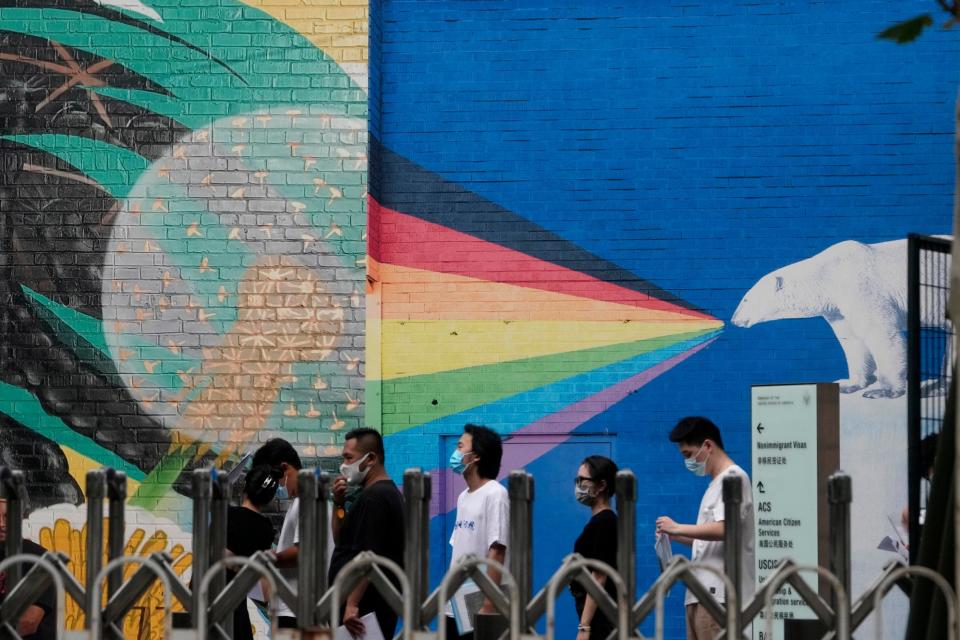Beijing making US-China exchanges 'impossible': US ambassador Nicholas Burns
US ambassador to China Nick Burns has accused Beijing of preventing Chinese citizens from taking part in American government programmes and thus making people-to-people exchange between the two countries "impossible".
In interview excerpts published on Tuesday in The Wall Street Journal, Burns said mainland officials have interfered in 61 public events organised by the US embassy in Beijing since November, either by pressuring Chinese citizens not to go or trying to intimidate those who did.
"They say they're in favour of reconnecting our two populations, but they're taking dramatic steps to make it impossible," he added, calling disturbances of embassy events "routine".
Do you have questions about the biggest topics and trends from around the world? Get the answers with SCMP Knowledge, our new platform of curated content with explainers, FAQs, analyses and infographics brought to you by our award-winning team.
The long-time diplomat said Beijing had fuelled anti-American sentiment, restricted Chinese citizens' access to US embassy social-media posts and made it harder for mainland students to attend American universities.

Visitors line up outside the US embassy in Beijing in August 2022. Photo: AP alt=Visitors line up outside the US embassy in Beijing in August 2022. Photo: AP>
The US has long accused Beijing of discouraging Chinese citizens from taking part in American government-funded activities.
While US State Department officials recently spoke about such treatment, it is uncommon for the ambassador to Beijing himself to express these concerns.
Tensions between the US and China persist in areas ranging from trade to human rights, but relations somewhat stabilised after US President Joe Biden met his Chinese counterpart, Xi Jinping, in San Francisco in November.
As part of that summit, both leaders agreed to advance people-to-people ties, something they reiterated in an April phone call.
In November, Xi announced plans to welcome 50,000 young Americans to China over the next five years in exchange and study programmes.
Burns, too, has consistently advocated for more Americans in China since assuming his post in 2022, particularly in light of a significant decline in numbers during the coronavirus pandemic.
"We need to have lots of young American women and men speak Mandarin and have experience in China, working in our government, leading our corporations," he said at an Asia Society event in New York earlier this month.
And despite the State Department's travel advisory for mainland China, which asks Americans to "reconsider travel", Burns has repeatedly said American students have not faced major threats to their safety in China.
But the envoy also said he was "angered" by the stabbings of four American college instructors in Jilin this month, telling the Wall Street Journal he wanted more transparency about the perpetrator's motive. No motive has yet been identified.
Later on Tuesday, State Department spokesman Matthew Miller said the US still believed in increasing people-to-people ties with China, but that Beijing's interference in US cultural programming "runs counter" to commitments made in San Francisco.
The Chinese embassy in Washington, for its part, called Burns' claims about Beijing's conduct "totally untrue".
"There is no restriction on Chinese citizens' participation in people-to-people and cultural exchanges," embassy spokesperson Liu Pengyu said.
Beijing has frequently complained that Washington restricts the movement of its US-based diplomats and harshly interrogates or deports some Chinese citizens holding valid American visas.
Meanwhile, the Chinese embassy in Washington has been hosting numerous events to celebrate people-to-people ties between the two countries.
"China is willing to be a friend and partner of the United States," said Xie Feng, China's ambassador to the US, at one such embassy event last month.
This article originally appeared in the South China Morning Post (SCMP), the most authoritative voice reporting on China and Asia for more than a century. For more SCMP stories, please explore the SCMP app or visit the SCMP's Facebook and Twitter pages. Copyright © 2024 South China Morning Post Publishers Ltd. All rights reserved.
Copyright (c) 2024. South China Morning Post Publishers Ltd. All rights reserved.

 Yahoo Finance
Yahoo Finance 